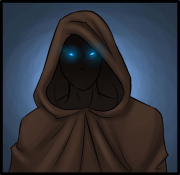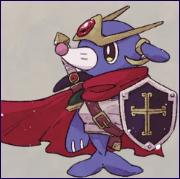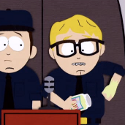|
Subjunctive posted:I don't follow this. There are a billion playbooks and variants out there in the PbtA ecosystem. Are they not basically splatbooks? Apocalypse World 1e has 12 core playbooks and 9 limited playbooks. 2e has 11 core playbooks and 7 limited playbooks. Monsterhearts 1e has a semi-official expansion that adds more playbooks. Fellowship has added a few extra playbooks for sale, too. These are all over like, years of the games being out. I don't know where you're getting the billion playbooks from unless you're counting the swampy muck of fan hacks. Dungeon World has a ton of those... but I don't recall them getting any more official content. As far as variants, there's a large variety of people hacking the PbtA system, but ironically the way d20 and PbtA are most alike is that the best variants barely resemble each other and their playbooks can't be transposed without some work. This is either because foreign playbooks would clash tonally with the game they're ported to, a matter of numbers and scale being different, or the playbooks being dependent on a mechanical system the other game just doesn't have. There's also a practical limit to how many playbooks are really sensible to add to a PBtA game and still maintain unique thematic and mechanical niches for each class. Yes this last point is also applicable to D&D.
|
|
|
|

|
| # ? May 9, 2024 18:23 |
|
I think you guys are kind of missing the point. The question is not "is the RPG industry self-sustaining" because it self-evidently is. There's the industry, there's all these products it's churning out. The question is: if we start with a premise of "creating a significant revenue stream that would support professional RPG creators with skillsets similar in level to professional technical writers, editors, and artists is necessary in order to have an RPG industry that produces high quality products," then pointing to the revenue of various crowdfunded RPG products is irrelevant. The question is: how many full-time professionals are earning wages competitive with the industries that otherwise steal every qualified person who might make RPGs professionally? On that scale, there's Paizo, and then there's a bunch of also-rans. I guess D&D probably pays five or six people competitive wages. I don't have a clue what that number might be for the other larger outfits like white wolf, modiphius, etc. but my wild rear end guess is that most of those companies at best pay their CEOs $100k a year, and everyone below them are being paid wages that aren't competitive and are basically doing it for the love of the work and a survivable wage. Subjunctive posted:We need more Paizos -- more companies that understand the economics of building a viable RPG business -- and fewer indie at-cost indiegogo darlings. There needs to be enough money in the system that people who are great can make a great living, and people who are just ok can make a decent living being directed by the great people. This exactly. A series of kickstarters that make $150k each or whatever are probably returning wages for the people behind them on the order of $25k a year or something horrible like that. Meanwhile any brand new fresh out of school technical writer can get an entry level position for $60k+ a year. Similar story for technical editors. And this: Jimbozig posted:Your typical RPG book has between $3000 and $10000 of art. That is pretty sad too. $5k for what, like 30+ pieces of artwork? I bet for most of the artists this works out to not much more than minimum wage. And let's be honest: a lot of the art is done for free, and as we know, tons of indie RPG projects are basically a wash financially, e.g. they're volunteer projects where all of the revenue went to expenses and nobody got paid anything for their time or skills. The entire pen & paper RPG industry is probably paying less than 100 people what their skills should be worth on the open market (if they are actually skilled and experienced), and that's astounding. The result is a generally poor quality often discussed in this thread, and that quality level cannot change until gamers start recognizing top quality with much bigger profit margins for the producers of it.
|
|
|
|
Leperflesh posted:I think you guys are kind of missing the point. Does anyone actually know what the average Paizo employee gets paid? Because it seems like there are some unfounded underlying assumptions that working for Paizo is somehow more profitable than establishing yourself as a successful independent crowdfunded game designer, to say nothing of being competitive with other entertainment industries. I would also argue that very few, if any, Paizo employees have demonstrated skills on par with professional tech writers or editors. The RPG industry is one of passionate hobbyists, fullstop. Tabletop RPG consumers have, on average, extremely lax standards when it comes to the quality of products and are also extremely resistant to the notion that the games they purchase are significantly, often detrimentally, undercosted. The market by and large isn't willing to pay the money that raising the quality of the product would require in order to not bankrupt its creators, but they also don't seem to care as much if those creators cut corners so there's very little incentive for things to change on either side of the equation. Now maybe I'm way off base and Paizo is somehow paying its writers wages competitive with, say, the video game industry, but if it is then it certainly isn't getting what it's paying for.
|
|
|
|
I have a feeling Paizo is paying cutthroat rates for freelancers and isn't using staff writers at all. I haven't gone over their product listings to confirm this but everything I've heard leads me to believe they pay closer to the "barely afford ramen" end of the payscale.
|
|
|
|
How many fulltime staff does Paizo actually have, anyway? I know they've employed freelancers for years, and if there's one constant in the industry it's that freelancers get payed like poo poo no matter who they're working for.
|
|
|
|
I have no idea, and am basing my assumptions about Paizo on the statements made about Paizo by others in the last page or two. At the very least, they're sustaining an aggressive marketing campaign... so they're generating enough profits to pay a marketing team. Kai Tave posted:The RPG industry is one of passionate hobbyists, fullstop. I agree that's the current state of things, but I disagree that it's inevitable or necessary. Consumer expectations can be changed. One of the discussions on the last few pages was pointing out how there's a woeful dearth of quality reviews for games; I don't think that's inevitable either. I think one of the things that prevents RPGs from becoming more mainstream is the lack of effective, quality marketing. I recall when, for a brief period, D&D was legit mainstream with Red Box basic D&D being sold at Sears and KMart. Yes, we all know how badly TSR mismanaged that bonanza - a total lack of effective product management made the marketing decisions basically random and scattershot, etc. But I don't believe that the huge surge in the mainstream appeal of board games that extend outside the traditional "family" games (monopoly, life, connect four, etc.) is impossible to replicate with RPGs. And look at how Magic took off; design and marketing go hand in hand, and Garfield/Wizards figured out a way to build a super nerdy fantasy game property into something that had appeal to a vastly broader audience. If you sell a lot more units, you don't have to necessarily raise the per-unit prices beyond what the average RPG nerd is willing to pay. And one of the reasons total unit sales for any given indie product are low, is because there's a very poor quality filtering mechanism in place to differentiate between the literally thousands of RPG products available - in part due to lovely reviews, in part due to lack of good marketing savvy, in part due to the nature of RPG indie businesses (being run by the content creators rather than experienced businesspeople), and probably for other reasons I'm not entirely clear on. But I don't think that has to be the case. I feel like there's got to be a way forward into a period where well-paid executives, designers, artists, and editors put out excellent products with mainstream appeal that sell hundreds of thousands or even millions of units.
|
|
|
|
http://paizo.com/paizo/about/contact seems to be a fairly comprehensive list of actual employees, considering it actually includes customer support
|
|
|
|
Kai Tave posted:Does anyone actually know what the average Paizo employee gets paid? Because it seems like there are some unfounded underlying assumptions that working for Paizo is somehow more profitable than establishing yourself as a successful independent crowdfunded game designer, to say nothing of being competitive with other entertainment industries. I would also argue that very few, if any, Paizo employees have demonstrated skills on par with professional tech writers or editors. I agree with this totally. It seems like some people are saying that someone could come along and just make a new Paizo. And maybe they could, but I don't clearly see how. What would they compete on? Compete on price? We've just been saying that RPG books priced lower than Paizo just can't make a sustainable business. Compete on quality? There are vast numbers of RPG fans who will deny that quality is even possible or measurable, or defend products of the lowest quality. Compete on name recognition? If you're not D&D, how are you going to do this? We have companies that put out better products than Paizo that also have good name recognition (Vampire, Call of Cthulu, etc.) and don't charge more than Paizo... and they aren't as big as Paizo. Leperflesh posted:I think one of the things that prevents RPGs from becoming more mainstream is the lack of effective, quality marketing. I recall when, for a brief period, D&D was legit mainstream with Red Box basic D&D being sold at Sears and KMart. Yes, we all know how Man, some things are just niche. You can be the best nipple clamp company in the world, putting out the best nipple clamps at an unbeatable price point, and even then the best marketing campaign possible isn't going to bring nipple clamps to the mainstream. I don't want to say that it's impossible for RPGs to become mainstream, but I don't think marketing alone can make that a reality. Yeah, way back when D&D was in Sears... but I have to imagine that a lot of people who bought that box were put off by what was inside it, or found it not to their tastes. No amount of marketing would make them buy another product like the one they just bought and didn't enjoy.
|
|
|
|
Leperflesh posted:I agree that's the current state of things, but I disagree that it's inevitable or necessary. Consumer expectations can be changed. One of the discussions on the last few pages was pointing out how there's a woeful dearth of quality reviews for games; I don't think that's inevitable either. The main thing that prevents RPGs from becoming mainstream, and I've brought this up each and every time the discussion has wheeled around to this topic, is that they have an enormous footprint of effort and time investment required in order to play them, and the people of 2017 are inundated with entertainment options which are less onerously demanding of their time and commitment in order to have an enjoyable game-playing time with their friends. Yes, RPGs have unique qualities that other types of games can't replicate, but at the same time other games don't require you to dedicate 6-8 hours every Saturday or Sunday from now to ???????? in order to have a proper, fulfilling game. Boardgames are considered long-running if they take half that time. World of Warcraft was successful in large part because it catered to both die-hard poopsockers who'd spend 18 hours a day raiding as well as people who wanted to sit down, smash murlocs for an hour, and log off. Magic is a great example of this in action. Magic is a game you only need one other person to play with as opposed to a group. A game of Magic generally lasts 30 minutes at most. It's portable enough that you can keep a deck in your pocket. When I was in school people played Magic during lunch break. This is ignoring the other various factors that played into Magic's success like the random booster pack and rarity chasing model combined with the extremely small physical footprint making it the equivalent of a slot machine for nerds that stores could stock by the register for quick impulse purchases, as opposed to big hardback books taking up shelf space retailing for ten times the cost of a booster pack. Board games may be a closer point of comparison because they require larger groups than 1v1 most of the time and they take longer to play, but they still generally take much less time than a single session of an RPG campaign and are generally (not always) much easier to set up and start playing without having to lay a lot of groundwork first, plus you get the satisfaction of playing a full game start to finish instead of a much more nebulous campaign which can very easily wind up petering out in an extremely anticlimactic fashion when Bob can't make it next week because he has to work a weekend shift and then Mary's kid gets the flu and she really needs to stay home and the GM's going through some poo poo at home and his head isn't in the right place and before you know it all the momentum is gone and nobody feels like picking it back up. Throwing marketing at RPGs isn't really the issue, it's not like people aren't aware this stuff exists. Nerd celebrities like Wil Wheaton have Youtube videos of themselves playing RPGs. You see it show up in Stranger Things. Penny Arcade has done D&D stuff since 4E came out and it's a comic with millions of daily readers and a ton of media outreach including their own charity fundraiser. The problem is that most people are not looking for the gameplay experience RPGs provide, and likely still won't be interested even if you throw millions of dollars of money at Madison Avenue to try and make it happen. Maybe there's a vast untapped market of people wholly unaware of the existence of tabletop RPGs waiting to embrace the hobby if only they were being marketed to, but I remain intensely skeptical. Now you could try and reinvent the tabletop RPG to try and chase a broader market maybe, but I'm reasonably certain that any such changes you'd have to make in that regard would be rejected by the market that currently exists.
|
|
|
|
Like, bear in mind that this discussion started out with Alien Rope Burn's observation that Paizo had managed to turn Pathfinder into what is effectively a subscription service. What Paizo sells to its dedicated fans is only partly related (if that) to game design, gameplay, or writing quality.
|
|
|
|
Kai Tave posted:The main thing that prevents RPGs from becoming mainstream, and I've brought this up each and every time the discussion has wheeled around to this topic, is that they have an enormous footprint of effort and time investment required in order to play them, and the people of 2017 are inundated with entertainment options which are less onerously demanding of their time and commitment in order to have an enjoyable game-playing time with their friends. Yes, RPGs have unique qualities that other types of games can't replicate, but at the same time other games don't require you to dedicate 6-8 hours every Saturday or Sunday from now to ???????? in order to have a proper, fulfilling game. Boardgames are considered long-running if they take half that time. World of Warcraft was successful in large part because it catered to both die-hard poopsockers who'd spend 18 hours a day raiding as well as people who wanted to sit down, smash murlocs for an hour, and log off. A specific point I'd raise to raise in this regard is holy poo poo RPG designers please please please always include a set of pregen characters with your game, and maybe a starter adventure, too. Introducing RPGs to people new to the hobby, or even introducing a new game to an already-playing group, is made much more onerous by the problem of having to set aside 30+ minutes before you can even get started, or asking the GM to make up a bunch of poo poo that they're probably not completely comfortable with yet. The 2-hour+ playing time is an obstacle that's not going away easily, but you can at least make the experience more plug-and-play.
|
|
|
|
Two+ hour playing time? poo poo, I can't think of an RPG, even one-shots, I've been in that have taken less than twice that long. I played in an Eberron one-shot GM'd by Keith Baker who brought pregens he'd made himself to a group where everyone was already familiar with RPGs and things still went so overly long that we had to rush through the ending battle to wrap things up.
|
|
|
|
I run two-hour sessions and rarely go over. I'm thinking of going to three because Chronicles of Darkness's play structure is a lot more complicated than "everybody's together at nearly all times and the main point of the game is to explore a dungeon and get into fights" but I would not only expect but outright hope my players would mutiny if I suggested a 6+ hour session of anything. I might do four hours if it was all in person and everyone wanted exactly the same thing out of the game in terms of content but I don't have either of those, sadly.
|
|
|
|
gradenko_2000 posted:A specific point I'd raise to raise in this regard is holy poo poo RPG designers please please please always include a set of pregen characters with your game, and maybe a starter adventure, too. Pregens and a potted sample adventure are the sort of thing that should also be on the game company's website.
|
|
|
|
gradenko_2000 posted:A specific point I'd raise to raise in this regard is holy poo poo RPG designers please please please always include a set of pregen characters with your game, and maybe a starter adventure, too. Also: Put those pre-gens together as the -very last thing you do and preferably by someone who hasn't been living and breathing rules changes for however long you've been working on it, because holy poo poo, the number of pre-gens across multiple games that are broken by the rules as written, based on assumptions from 2 versions ago, or both. I mean, goddamn. .
|
|
|
|
I've done a lot of two-hour oneshots, and have run campaigns with two-hour sessions each. Usually it's the mechanically-intensive games (i.e. D&D 4e, high-level 3e) that make things take so long that I wish I had a little more time. Sometimes I even run out of planned plot by minute 90 or so, but that's because I tend to be very straightforward and rather forgiving to the players. My main point is that, regardless of how long your sessions last, it should be considered best practice to include pregens and an adventure to minimize the "set-up time" of a game before y'all even meet in a tavern. The rough equivalent of just giving you a rulebook and little else would be like if I bought a WW2 East Front wargame, and not only would I have to learn the rules, I'd also have to search for the actual OOB of the 1st Panzer Division as of July 1941, and also look for a hex-map covering the approaches to Smolensk.
|
|
|
|
gradenko_2000 posted:A specific point I'd raise to raise in this regard is holy poo poo RPG designers please please please always include a set of pregen characters with your game, and maybe a starter adventure, too. Bonus points if they're easily reverse-engineered, or actually good examples of playable characters. Zero if they've been tossed undocumented bennies. I've seen that stunt a few times, including what I dimly recall being an early edition of Shadowrun.
|
|
|
|
Man, I feel like an outlier here. I don't think I've ever been in an RPG campaign where a session neatly wrapped up after two hours. I mean, maybe if you edited out the various bits of tabletalk, asides, making plans, pausing for food, etc. you might be able to boil down the total amount of pure gameplay down to a couple hours, but I've never had a single session in my life where things only lasted for two hours table to door.
|
|
|
|
Kai Tave posted:Man, I feel like an outlier here. I don't think I've ever been in an RPG campaign where a session neatly wrapped up after two hours. I mean, maybe if you edited out the various bits of tabletalk, asides, making plans, pausing for food, etc. you might be able to boil down the total amount of pure gameplay down to a couple hours, but I've never had a single session in my life where things only lasted for two hours table to door. This. My short sessions with adults are 6 hours, and the leisurely ones are 10-12 including breaks for lunch / dinner / tea. Even the 5e game I run for some kids is three hours, and if we could make the schedules work we'd lengthen that to four in a heartbeat, because it is simply Not Enough Time.
|
|
|
|
Bieeardo posted:Bonus points if they're easily reverse-engineered, or actually good examples of playable characters. Zero if they've been tossed undocumented bennies. I've seen that stunt a few times, including what I dimly recall being an early edition of Shadowrun. And late editions! Pretty much all editions to think of it, but I recall Shadowrun Anarchy being especially bad as a huge chunk of the book is invalid pregens.
|
|
|
|
Kai Tave posted:Man, I feel like an outlier here. I don't think I've ever been in an RPG campaign where a session neatly wrapped up after two hours. I mean, maybe if you edited out the various bits of tabletalk, asides, making plans, pausing for food, etc. you might be able to boil down the total amount of pure gameplay down to a couple hours, but I've never had a single session in my life where things only lasted for two hours table to door. I think I could get my weekly 4e maptools 3.5-4 hour game down to 2 hours if everyone was constantly paying attention, no one ever afk'd to go to the bathroom just before their character was faced with a crucial decision, people's families or roommates didn't cause unexpected pauses, we weren't chatting OOC in IRC, we didn't have to look up esoteric rules every now and then (after almost a decade lol), etc., but I also think that if we did manage to hyper-focus for those two hours we'd still just play another 90 minutes or so because we wanted to. But that isn't gonna happen anyway. So don't worry not everyone manages those super speedy sessions.
|
|
|
|
Bieeardo posted:Bonus points if they're easily reverse-engineered, or actually good examples of playable characters. Zero if they've been tossed undocumented bennies. I've seen that stunt a few times, including what I dimly recall being an early edition of Shadowrun. Every edition of Shadowrun. Every one. Even the current, 5th Edition, has the sample characters impossible to create by rules as written, and overstatted heavily, and Anarchy's pregens might as well be for another game entirely.
|
|
|
|
Kai Tave posted:Man, I feel like an outlier here. I don't think I've ever been in an RPG campaign where a session neatly wrapped up after two hours. I mean, maybe if you edited out the various bits of tabletalk, asides, making plans, pausing for food, etc. you might be able to boil down the total amount of pure gameplay down to a couple hours, but I've never had a single session in my life where things only lasted for two hours table to door. It's not something I'm proud of, by any means. I stick to 2-hour sessions because that's what my schedule allows, accounting for extensions to wrap things up. I'd play longer in a heartbeat if I could: one of the best experiences I had was doing the entire Slaying Stone module in a single 5-hour run.
|
|
|
|
FMguru posted:Pregens and a potted sample adventure are the sort of thing that should also be on the game company's website. And you're ready for free RPG day ! The last game I did live was the first PbtA game I'd run. I managed roughly 2.5 hour sessions, and they were rough to run. I'd say two hour minimum for a session, and if you have the prep and the stamina go for 4 or more. Being a GM for 8 hours ? Oh god, no.
|
|
|
|
I can't imagine a game over 5+ hours. Seems horrid. But I was able to run through Fiasco in 60+ minutes with my family, all nongamers. (We found a good-enough endpoint by scene 8 or so). Then again, I'm 90%+ PbTA so there are no mechanical hangups. You do something or you Get Got.
|
|
|
|
8 hours isn't a big deal so long as things are moving along, but I'm a warhams player so I have a pretty strong tolerance for tactical miniatures combat in my RPGs and that can drag a little.
|
|
|
|
Yes, it seems the answer, in the end, as with many things, is to smash capitalism.
|
|
|
|
ProfessorCirno posted:Yes, it seems the answer, in the end, as with many things, is to smash capitalism. the best thing for RPG development is mincome
|
|
|
|
Kai Tave posted:The main thing that prevents RPGs from becoming mainstream, and I've brought this up each and every time the discussion has wheeled around to this topic, is that they have an enormous footprint of effort and time investment required in order to play them, and the people of 2017 are inundated with entertainment options which are less onerously demanding of their time and commitment in order to have an enjoyable game-playing time with their friends. It's an excellent point that I didn't address. Yet, there are many mainstream hobbies that demand similar amounts of time (I won't dispute the 4 hours playing sessions, but I definitely dispute the weekly sessions requirement; I've never in my life played that frequently). I agree in principle that it's a significant obstacle. But: not moreso than many other more "mainstream" hobbies and interests. Learning to play a musical instrument? You're probably practicing 2 to 3 hours a week, including your weekly 1 hour lessons. Watch football? 3.5 hours a week, for 17 weeks (with a bye) for a regular NFL season. Baseball? poo poo man, probably nobody watches every game their team plays, but a MLB team plays 162 games in six months, and MLB games average about 3 hours long. Do you watch TV shows? The average american watches over five hours of TV every day. (source)Maybe some of that is simultaneous to other activities, but still... if you follow four different weekly hourlong shows, that's 4 hours a week. Playing RPGs does have a steep learning curve, but so do many other hobbies and passtimes. The major obstacle isn't the time commitment, exactly: it's a combination of the requirement to find a group, and then agree on a game; the complexity and difficulty of play compared to many other hobbies and passtimes (TV being the obvious easy mode for leisure time, but many mainstream hobbies like woodcraft or golf being arguably more challenging and definitely far more expensive); and probably most of all, the sheer "nerdiness" of the endeavor, the kind of "embarrassment factor" of having to act out a fantasy character in front of people you know while following a bunch of complicated rules. But fantasy nonsense is mainstream now, perhaps more so than ever before. Game of Thrones and The Walking Dead are two of the most popular TV shows of all time. Harry Potter and Star Wars are totally mainstream. I think people aren't comfortable with improvisational acting - surveys continuously find that people fear speaking in public more than they fear death, and there's got to be some overlap between avoiding traditional RPG roleplay and having some kind of stage fright. Basically I think the resistance to RPGs isn't really about the challenges of arranging enough time with a group to do it. It's cultural. I still wouldn't feel comfortable mentioning my interest in the new Conan RPG from Modiphius to my co-workers, even though they're all nice people who I presume wouldn't judge me. There's still a lingering aroma of the basement-dwelling pimpled virgin clinging to RPGs, and I think maybe some effective marketing could be part of the cure for that misperception. Better ease of groupfinding/matchmaking tools are within view. Lightweight systems can cut the learning curve, but better rules writing and presentation and accessibility (online rules lookup with standardized search tools? official published 'getting started' videos? Live online expert support?) could make the learning curve a lot less frustrating to climb, too. But to me, the #1 thing has to be the stigma. We need RPGs to feel as normal and reasonable as any other group leisure activity, like sports, cocktail parties, going out to eat with friends, seeing a movie, or taking an art class at the local community college.
|
|
|
|
I don't really think we need more large companies pumping out bland games but the fact that Wotc/hasbro hasn't marketed D&D hardly at all in the last 20 years is amazing like i know it's a rounding error on their books but still How has there not been any multimedia D&D poo poo in decades?
|
|
|
|
Leperflesh posted:It's an excellent point that I didn't address. Yet, there are many mainstream hobbies that demand similar amounts of time (I won't dispute the 4 hours playing sessions, but I definitely dispute the weekly sessions requirement; I've never in my life played that frequently). I agree in principle that it's a significant obstacle. But: not moreso than many other more "mainstream" hobbies and interests. Nerd stuff is actually super mainstream and while I don't think this means people won't look at you funny if you're animatedly talking about your adventures in elfmurder on the bus I feel like we're past the point where mentioning to someone that you play D&D on the weekends means they're instantly going to brand you a social pariah. But watching television? Really? That's a comparison you're going to go with? Something that requires zero effort, can be done at a multitude of times on demand thanks to modern television, and can be done by yourself or in a group as desired, with no more commitment beforehand other than "I feel like watching some TV?" You're right that it isn't the time commitment on its own, but it's not cultural inertia either. RPGs require commitment on multiple fronts from multiple people, it requires time and effort as a concerted group endeavor, and it has a lot more moving parts that can cause everything to grind to a halt if they aren't all working smoothly. Like here's a recent-ish example of this sort of thing in action, I was going to a regular board game night at the local game store and I'd struck up an amicable friendship with a number of the other people who visited regularly, we'd get together and play games on our own. One of our favorites, one of my own favorites, is Argent: the Consortium, which is this fantastically fiddly worker placement game. It has tons of moving parts and components and poo poo to keep track of. Just setting the game up could take upwards of 15-20 minutes. A 3-4 player game could go as long as three hours. But we enjoyed playing it and did so frequently, and whenever someone wasn't in the mood for Argent or didn't have enough time or couldn't be there that evening, oh well, we'd just play something else instead, that's cool too. Then I got a copy of Pandemic Legacy, a board game that has a built in campaign. I was super stoked to play this because reviews were all incredibly favorable and I'd loved the hell out of Risk Legacy so I gathered up this group of friends and said "we've gotta do this." We had a fuckin Facebook group set up for it and everything. Everybody loved it, we were having a blast. But the problem is that if someone couldn't make it that night that meant we had to put the campaign on hold, and it's one thing when you're talking about regular one-and-done boardgames but now all at once there was this extra layer of impediment to the process. If I really wanted I could always invite someone new to play Argent and teach them the rules, but I didn't really want to tell someone "okay, you're going to be substituting for a player in this ongoing campaign using their character and a bunch of stuff has already happened" or have to tell that regular player when they returned that we'd moved ahead without them, etc. A big part of the fun of the game was experiencing things together, as a group. Suddenly a lot of the ease of doing this particular social activity was gone. It wasn't that there'd never been breaks and absences and sudden emergencies before, but they'd never really affected the ability to continue playing a game the same way. So when we couldn't line things up juuuuust right, we didn't play Pandemic Legacy. If we had three members of the group but a fourth one, any one of them, couldn't be there? No Pandemic Legacy, gotta do something else. Did someone get a text and have to leave early? Well poo poo, I guess we...stop for the night then, and do something else. When everything was in alignment it was great, we were all excited to see what happened next. And then the group fell apart. One person moved, one person simply stopped showing up, and one person got big into political activism and started devoting more and more of their time to that. The end result was that I now had a not even half-finished Legacy game on my hands that would pretty much never get completed because what am I gonna do, bring a new group in and tell them "so yeah, you guys missed all this stuff, I guess you had to be there?" A RPG campaign, obviously, is much more clean slate than something like Pandemic Legacy which has actual physical components representing campaign progress, but the principal is the same...all the little, I don't know what you'd want to call it, social speedbumps which didn't matter as much when it was something with much less demanding of regular commitment from multiple people suddenly became magnified when you had this ongoing group endeavor. Not every RPG campaign implodes like this, no...but by far the vast majority I've participated in have. Everyone I've ever talked to who plays RPGs says the same thing. And frankly it is exhausting and it is annoying to go into something not even with grand ambitions (because you very quickly get disabused of those) but just the hope that this time you're really gonna make a go of it, you can tell that everyone's on board, and then jobs/kids/illness/family emergency/car trouble/tired from work/just not in the mood/etc and you're right back at square one with a bag full of poorly edited game manuals and a pocket full of funny dice. Now not every time you sit down and play an RPG has to be a campaign, no. But if that's the approach you're going to go with then you're first going to have to work real, real hard to break that extremely common and generally accepted perception of the RPG experience, that you aren't just playing oneshots with pregenerated characters but ongoing campaigns where the story changes in response to your actions and twists and turns abound. D&D doesn't have 20 character levels for nothing. The entrenched RPG hobby market is likely to be apathetic to resistant to games designed primarily for one-shots because, again, they're steeped in the idea (however impractical it may be) that RPGs = ongoing campaign, which means that any attempt to jumpstart an RPG industry revolution along this lines means you're probably going to have to try and create an entirely new market from scratch while also convincing them that they really want to play nuRPGs instead of card games, board games, video games, or any of the other industries competing for their limited social time and dollars. edit; I guess hardcore big group MMO raids are another similar example, every person I've ever known who was into that sort of thing described it as 90% frustration and herding cats and juggling schedules versus 10% actual fun. Kai Tave fucked around with this message at 08:33 on Aug 24, 2017 |
|
|
Bieeardo posted:Bonus points if they're easily reverse-engineered, or actually good examples of playable characters. Zero if they've been tossed undocumented bennies. I've seen that stunt a few times, including what I dimly recall being an early edition of Shadowrun. But if you used 4e prices for the cyberware instead of 5e's, they came out much closer to on budget.
|
|
|
|
|
Elfgames posted:I don't really think we need more large companies pumping out bland games but the fact that Wotc/hasbro hasn't marketed D&D hardly at all in the last 20 years is amazing like i know it's a rounding error on their books but still How has there not been any multimedia D&D poo poo in decades?
|
|
|
|
MadScientistWorking posted:The last time I looked this up it is kind of depressing and sad but its partially Gary Gygax's fault. He hosed up the D&D licencing so badly that only recently did Hasbro get it fixed. Its why at one point there was made for tv D&D movies. IIRC Hasbro's never really bothered to unfuck the D&D video game licensing since they sold Hasbro Interactive, and that's why the last serious D&D video game was NWN2 back in 2006. Everything since has been wanna-be Gauntlet clones, and the most recent one was Sword Coast Legends which flopped hard.
|
|
|
|
Plus Neverwinter MMO, right?
|
|
|
|
Zereth posted:I believe Shadowrun 5e's street sam pregen had purchased their cyberware at prices much, much lower than listed in the book. 1st ed had a pregen with military grade armor and an LMG, they called it Mercenary so I thought I could just put them as is in side encounters...
|
|
|
|
There is actually a new D&D game in development! https://www.youtube.com/watch?v=uA_4C_6FgAw it's an idle clicker game
|
|
|
|
Bieeardo posted:Bonus points if they're easily reverse-engineered, or actually good examples of playable characters. Zero if they've been tossed undocumented bennies. I've seen that stunt a few times, including what I dimly recall being an early edition of Shadowrun. And for god's sake make sure that the sample adventure actually matches the intended player experience. Way too often these are just terrible. The sample adventure in Firefly, for example, ends up showing how the Cortex mechanics can be very efficiently applied to a massive railroad. Even through I love Strike!, anyone wanting tactical combat rules is going to want positioning, terrain, and cover to be significant, and is going to be very bemused when Trouble In Hogtown has no maps and effectively says it should be handwaved or random. I've had designers I've asked about this say "well the sample adventure is on training wheels, it won't be the full experience" but that's a terrible idea. Not only is it going to be the group sale of your game, but the book usually contains no guidance about how to take the training wheels off. Kai Teve posted:Man, I feel like an outlier here. I don't think I've ever been in an RPG campaign where a session neatly wrapped up after two hours. I mean, maybe if you edited out the various bits of tabletalk, asides, making plans, pausing for food, etc. you might be able to boil down the total amount of pure gameplay down to a couple hours, but I've never had a single session in my life where things only lasted for two hours table to door. For a short while I ran a Fantasy Flight Star Wars game where sessions typically went only 2-3 hours, but the players felt they were short. I can't help but think a lot of this is D&D legacy and the idea that every environment must be explored room by room and every potentially trapped door must be a huge palaver involving exact placement and skill routines. Whereas in that case I was going more along the lines of "well, you want to find the reactor on the abandoned spaceship, you know enough about ships that you'd know where the reactor would be, so you can more or less walk there with a couple of rolls for the environment". Partly because the first game I ever tried to GM was Over The Edge and I tried to make the players go room by room and door by door while they were visiting someone in the hospital (to be fair, there's a lot of weird stuff in the hospitals in OtE). Leperflesh posted:Learning to play a musical instrument? You're probably practicing 2 to 3 hours a week, including your weekly 1 hour lessons. Watch football? 3.5 hours a week, for 17 weeks (with a bye) for a regular NFL season. Baseball? poo poo man, probably nobody watches every game their team plays, but a MLB team plays 162 games in six months, and MLB games average about 3 hours long. Do you watch TV shows? The average american watches over five hours of TV every day. (source)Maybe some of that is simultaneous to other activities, but still... if you follow four different weekly hourlong shows, that's 4 hours a week. Thing is, many of those are shared experiences in a way that RPGs aren't. Plenty of adults burn out on learning musical instruments if they aren't having any connection to others related to them. But you can talk to plenty of other people and make friends on the basis of following football, baseball, or popular TV. Nobody really cares what your RPG group did last session.
|
|
|
|
Countblanc posted:the best thing for the creative class and just about everyone else is mincome How good would games be if anybody could commit to making them without risking their lives?
|
|
|
|

|
| # ? May 9, 2024 18:23 |
|
homullus posted:How good would games be if anybody could commit to making them without risking their lives? This could be worded better.
|
|
|











































